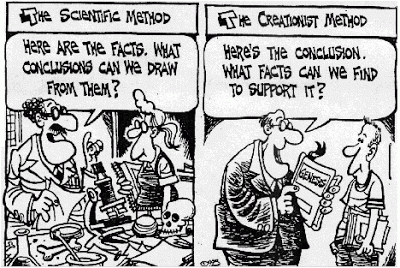Confirmation bias
From Wikipedia:
"Confirmation bias is a tendency of people to favor information that confirms their beliefs or hypotheses. People display this bias when they gather or remember information selectively, or when they interpret it in a biased way. The effect is stronger for emotionally charged issues and for deeply entrenched beliefs. For example, in reading about gun control, people usually prefer sources that affirm their existing attitudes. They also tend to interpret ambiguous evidence as supporting their existing position."
 |
| Source |
In other words when one person thinks his or her opinions are based on years of rational and objective analysis, but in reality they are the result of years of exposure to information that only confirmed his or her prior beliefs, while any information that was challenging the predetermined opinion was being ignored and/or rejected.
Why am I referring to this psychological phenomenon? Because I'm starting to enjoy reading behavioral economics more and more, but mostly because of this recent text from David Henderson where he quotes Milton Friedman:
"In 1964--to the disgust and dismay of most of my academic friends--I served as an economic adviser to Barry Goldwater during his quest for the Presidency. That year also, I was a Visiting Professor at Columbia University. The two together gave me a rare entree into the New York intellectual community. I talked to and argued with groups from academia, from the media, from the financial community, from the foundation world, from you name it. I was appalled at what I found. There was an unbelievable degree of intellectual homogeneity, of acceptance of a standard set of views complete with cliche answers to every objection, of smug self-satisfaction at belonging to an in-group. The closest similar experience I have ever had was at Cambridge, England, and even that was a distant second.The homogeneity and provincialism of the New York intellectual community made them pushovers in discussions about Goldwater's views. They had cliche answers but only to their self-created straw-men. To exaggerate only slightly, they had never talked to anyone who really believed, and had thought deeply about, views drastically different from their own. As a result, when they heard real arguments instead of caricatures, they had no answers, only amazement that such views could be expressed by someone who had the external characteristics of being a member of the intellectual community, and that such views could be defended with apparent cogency. Never have I been more impressed with the advice I once received: "You cannot be sure that you are right unless you understand the arguments against your views better than your opponents do."
Scott Sumner quoted the same thing, with an emphasis on Paul Krugman's 'New York' confirmation bias:
"Some have asked if there aren’t conservative sites I read regularly. Well, no. I will read anything I’ve been informed about that’s either interesting or revealing; but I don’t know of any economics or politics sites on that side that regularly provide analysis or information I need to take seriously. I know we’re supposed to pretend that both sides always have a point; but the truth is that most of the time they don’t."
It's very important to keep an open mind in thinking about economics (or any other social issue), removed of any ideological constraint, which is why I'm surprised that celebrated economists like Paul Krugman mostly keep it closed and with a strong political/ideological bias.
I consider myself a libertarian, primarily because I enjoy logical thinking, and libertarian arguments excel in that perspective. However, I don't blindly follow every libertarian idea, and always have my own uniquely formulated opinion on a variety of issues (except when it comes to personal liberties where I closely align with the libertarian mindset). In economics especially I tend to think a bit outside the paradigms of current economic theories, not because I want to create something new, but because I want to look at an issue from a variety of angles and always from a bigger picture before I reach a conclusion. This is why I favour new institutional economics and political economy.
Anyway, I hope that my political economist vocation and a tendency to look at the big picture are sufficient and necessary conditions for never falling into a confirmation bias trap.
Anyway, I hope that my political economist vocation and a tendency to look at the big picture are sufficient and necessary conditions for never falling into a confirmation bias trap.




I have often found that the people who preach free discourse and open mindedness, the academic world, are often the most closed minded of all.
ReplyDeleteI agree, that's too bad. And it makes me wonder a bit, doesn't it? I mean, I always preach open mindedness and free discourse :)
Deletedamn!